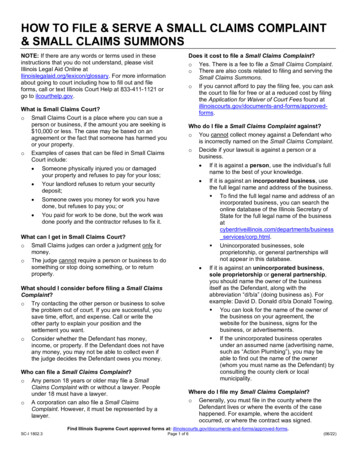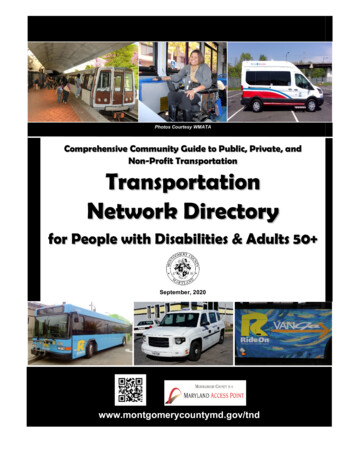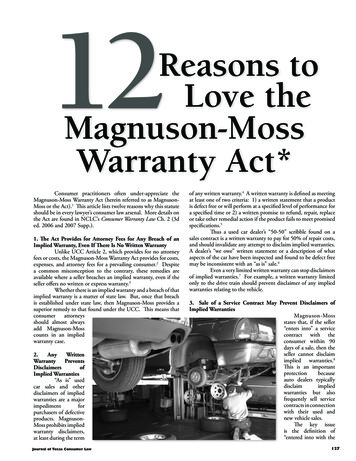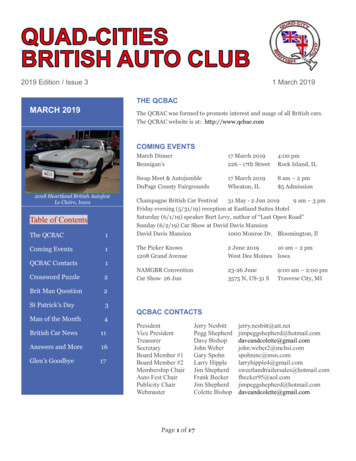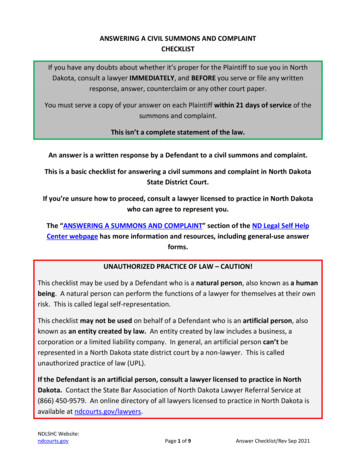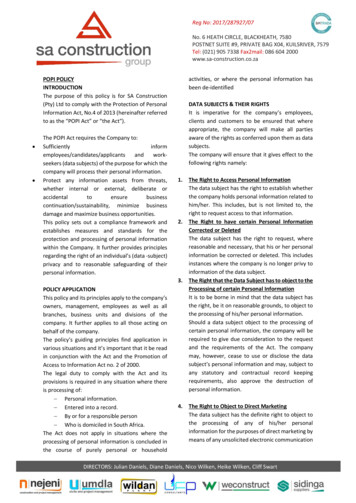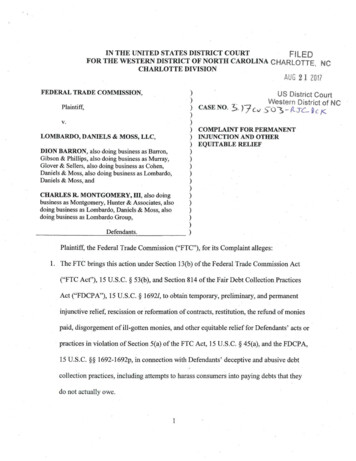
Transcription
IN THE UNITED STATES DISTRICT COURTFILEDFOR THE WESTERN DISTRICT OF NORTH CAROLINA CHARLOTTE NCCHARLOTTE DIVISION'AUG 21 2017FEDERAL TRADE COMMISSION,))Plaintiff,))v.CASE NO.5. )7US District CourtWestern District of NCGv S-0--S - fl:JL D( J )) COMPLAINTFORPERMANENT) INJUNCTION AND OTHER) EQUITABLE RELIEF)))))LOMBARDO, DANIELS & MOSS, LLC,DION BARRON, also doing business as Barron,Gibson & Phillips, also doing business as Murray,Glover & Sellers, also doing business as Cohen,Daniels & Moss, also doing business as Lombardo,Daniels & Moss, and)CHARLES R. MONTGOMERY, III, also doingbusiness as Montgomery, Hunter & Associates, alsodoing business as Lombardo, Daniels & Moss, alsodoing business as Lombardo Group,Defendants. ))))))Plaintiff, the Federal Trade Commission ("FTC"), for its Complaint alleges:1. The FTC brings this action under Section 13(b) of the Federal Trade Commission Act("FTC Act"), 15 U.S.C. § 53(b), and Section 814 of the Fair Debt Collection PracticesAct ("FDCPA"), 15 U.S.C. § 1692/, to obtain temporary, preliminary, and permanentinjunctive relief, rescission or reformation of contracts, restitution, the refund of moniespaid, disgorgement of ill-gotten monies, and other equitable relief for Defendants' acts orpractices in violation of Section 5(a) of the FTC Act, 15 U.S.C. § 45(a), and the FDCPA,15 U.S.C. §§ 1692-1692p, in connection with Defendants' deceptive and abusive debtcollection practices, including attempts to harass consumers into paying debts that theydo not actually owe.1
JURISDICTION AND VENUE2. This Court has subject matter jurisdiction pursuant to 28 U.S.C. §§ 1331, 1337(a), and1345, and 15 U.S.C. §§.45(a), 53(b), and 1692/.3. Venue is proper in this district under 28 U.S.C. § 1391(b)(l), (b)(2), (b)(3), (c)(l), (c)(2),(c)(3), and (d), and 15 U.S.C. § 53(b).PLAINTIFF4. The FTC is an independent agency of the United States Government created by statute.15 U.S.C. §§ 41-58. The FTC enforces Section 5(a) of the FTC Act, 15 U.S.C. § 45(a),which prohibits unfair or deceptive acts or practices in or affecting commerce. The FTCalso enforces the FDCPA, 15 U.S.C. §§ 1692-1692p, which prohibits abusive, deceptive,and unfair debt collection practices and imposes duties upon debt collectors.5. The FTC is authorized to initiate federal district court proceedings, by its own attorneys,to enjoin violations of the FTC Act and the FDCPA and to secure such equitable relief asmay be appropriate in each case, including rescission or reformation of contracts,restitution, the refund of monies paid, and the disgorgement of ill-gotten monies.15 U.S.C. §§ 53(b), 56(a)(2)(A), and 1692/(a).DEFENDANTS6. Defendant Lombardo, Daniels & Moss, LLC ("LDM") is a North Carolina limitedliability company with its principal place of business at 9700 Research Drive, Suite127-A, Charlotte, NC 28262. LDM has also used a mailing address at P.O. Box 562401 ,Charlotte, NC 28256. LDM transacts or has transacted business in this district andthroughout the United States.2
7. Defendant Dion Barron is a principal of LDM. He is also the owner of the trade namesBarron, Gibson & Phillips; Cohen, Daniels & Moss; Murry, Glover & Sellers; andLombardo, Daniels & Moss. He is also an authorized signatory on many of Defendants'bank and merchant accounts, and he is listed as an authorized user on Defendants' P. 0.Box application. At all times material to this Complaint, acting alone or in concert withothers, he has formulated, directed, controlled, had the authority to control, orparticipated in the acts and practices set forth in this Complaint. Defendant Barronresides in this district and, in connection with the matters alleged herein, transacts or hastransacted business in this district and throughout the United States.8. Defendant Charles R. Montgomery, III is the managing member of LDM. He is also theowner of the trade names Montgomery, Hunter & Associates; Lombardo, Daniels &Moss; and Lombardo Group. He is an authorized signatory on many of Defendants'bank and merchant accounts, and is the registrant for Defendants' Internet websitelombardodanielsmossllc.com. He is also listed as the contact person for Defendants'telecommunications services, which are often paid with his personal credit card.Defendants' P.O. Box is registered to Defendant Montgomery. At all times material tothis Complaint, acting alone or in concert with others, he has formulated, directed,controlled, had the authority to control, or participated in the acts and practices set forth·in this Complaint. Defendant Montgomery resides in this district and, in connectionwith the matters alleged herein, transacts or has transacted business in this district andthroughout the United States.3
COMMERCE9. At all times material to this Complaint, Defendants have maintained a substantial courseof trade in or affecting commerce, as "commerce" is defined in Section 4 of the FTC Act,15 U.S.C., § 44.DEFENDANTS' DECEPT IVE AND ABUSIVE COLLECTION PRACTICES10. Since at least March 2013, and continuing thereafter, Defendants have engaged in ascheme to defraud consumers through the collection and processing of payments fordebts that consumers do not actually owe or that Defendants do not have authority tocollect. Defendants contact consumers via telephone calls and make a series ofmisrepresentations and threats to convince consumers to pay the purported debts.11. Defendants have conducted their scheme to defraud consumers through and using avariety of trade names, including, but not limited to, Lombardo, Daniels & Moss; Barron,Gibson & Phillips; Cohen, Daniels & Moss; Montgomery, Hunter & Associates; Murray,Glover & Sellers; and Lombardo Group. Through the use of these names, manyconsumers have believed that their alleged debts have been referred to a law firm or anattorney for collection.12. To pressure consumers into paying the purported debts, Defendants' collectors typicallyinform consumers that they are delinquent on a payday loan or other debt and that legalaction will be taken shortly against the consumer. For example, Defendants have toldconsumers that they will be sued, have their wages garnished, or have their bank accountsfrozen. In numerous instances, Defendants' collectors advise consumers that they can4
avoid legal action by making a payment over the telephone via the consumer's credit ordebit card.13. In some instances, Defendants' collectors possess, or claim to possess, the consumers 'private information, such as Social Security numbers, bank account numbers, or namesand contact information of relatives, convincing consumers that the calls are legitimatecollection efforts and that consumers must pay the purportedly delinquent debts.14. In numerous instances, to coerce consumers into paying the purported debts, Defendants'collectors threaten consumers with arrest if they fail to pay the alleged debt immediately.For example, Defendants have told consumers that they would forward the case to theDistrict Attorney's office, they would go to the Sheriffs office to have consumersarrested, or that the consumers had committed bank fraud.15. In fact, in numerous instances when Defendants threaten consumern with legal action, nolegal action has been taken, Defendants do not intend to take any such legal action, nordo Defendants have authority to take any such legal action. Defendants also cannot haveconsumers arrested for non-payment of a private debt. Further, Defendants are not a lawfirm.16. Moreover, in numerous instances, consumers do not owe the purported debt orDefendants are not authorized to collect on the debt. In fact, in many instances whenconsumers contact the purported creditors, they discover either that they never had anydebts with those creditors or that their debts had already been paid.17. In numerous instances, Defendants' collectors use obscene or profane language in anattempt to coerce consumers into paying them. For example, Defendants' collectors told5
one consumer that she needed to pay "the f***ing thing" or go to jail. Another collectortold a consumer he was a "lying son of ab****," "white trash," and "not fit to hold ajob." In another instance, Defendants' collectors called a consumer "a f***ing deadbeatwho needs to pay their debts." Yet another collector cursed at a consumer's minordaughter.18. In numerous instances, Defendants repeatedly contact consumers on their home, cell, andwork telephones with the intent to intimidate and harass consumers into paying thealleged debts. For example, Defendants: (i) call consumers multiple times per day orfrequentlyov ran extended period of time (for example, calling some consumers three ormore times per day); (ii) call consumers' places of employment, even though thecollectors know or should know that it is inconvenient for consumers to receive callsthere or that consumers' employers prohibit consumers from receiving suchcommunications; and (iii) call consumers at times or places known or which should beknown to be inconvenient to the consumer (for example after 9:00 p.m.)19. In numerous instances, Defendants also have communicated with third parties. Innumerous such instances, Defendants: (1) already possessed location information for theconsumer, including the consumer's place of abode, telephone number, or place ofemployment; (2) disclosed the consumer's purported debt to the third party; or (3)represented to the third party that Defendants will commence legal action-includingarrest-against the putative debtor if the debt is not paid.20. In numerous instances, in initial communications with consumers, Defendants' collectorsfail to disclose that the call is coming from a debt collector who is attempting to collect a6
debt from the consumer, or that any information obtained from the consumer will be usedfor that purpose. And in numerous instances in subsequent ·communications withconsumers, Defendants' collectors fail to disclose that they are debt collectors.21. In numerous instances, Defendants fail to provide consumers, within five days after theinitial communication with consumers, a written notice containing (1) the amount of thedebt; (2) the name of the creditor to whom the debt is owed; (3) a statement that unlessthe consumer disputes the debt, the debt will be assumed valid; and (4) a statement that ifthe consumer disputes the debt in writing, Defendants will obtain verification of the debt.22. Many consumers pay the alleged debts that Defendants purport to be collecting becausethey are afraid of the threatened repercussions of failing to pay, because they believeDefendants are legitimate and are collecting real delinquent debt, or because they want tostop the harassment. · Generally, consumers make these payments using a credit card,debit card, or electronic transfer from their bank account.23. Since at least March 2013, Defendants have collected over 2.l million from consumersthrough their unlawful debt collection scheme.VIOLATIONS OF THE FTC ACT24. Section 5(a) of the FTC Act, 15 U.S.C. § 45(a), prohibits "unfair or deceptive acts orpractices in or affecting commerce."25. Misrepresentations or deceptive omissions of material fact constitute deceptive acts orpractices prohibited by Section 5(a) of the FTC Act.7
COUNT IFalse or Unsubstantiated Representations That Consumers Owe Debts26. In numerous instances, in connection with the collection of alleged debts, Defendantshave·represented, directly or indirectly, expressly or by implication, that:(a)The consumer is delinquent on a payday loan or other debt that Defendants havethe authority to collect; or(b)The consumer has a legal obligation to pay Defendants.27. In numerous instances, the representations set forth in Paragraph 26 are false ormisleading or were not substantiated at ·the time the representations were made.28. Therefore, the making of the representations as set forth in Paragraph 26 of thisComplaint constitutes a deceptive act or practice, in or affecting commerce in violation ofSection 5(a) of the FTC Act, 15 U .S.C. § 45(a).COUNT IIFalse or Misleading Representations Regarding Legal Action29. In numerous instances, in connection with the collection of alleged debts, Defendantshave represented, directly or indirectly, expressly or by implication, that:(a)Defendants are a law firm;(b)The consumer will be arrested or imprisoned for failing to pay Defendants; and(c)Defendants h ve taken, intend to take, or have authority to take formal legalaction against a consumer who fails to pay, such as filing suit.30. In truth and in fact, in numerous instances in which Defendants have made therepresentations set forth in Paragraph 29 of this Complaint:(a)Defendants are not a law firm;8
(b)The consumer will not be arrested or imprisoned for failing to pay Defendants;and(c)Defendants have not taken, do not intend to take, or do not have authority to takeformal legal action against a consumer who fails to pay, such as filing suit.31. Therefore, Defendants' representations as set forth in Paragraph 29 of this Complaint arefalse or misleading and constitute deceptive acts and practices in violation of Section 5(a)of the FTC Act, 15 U.S.C. § 45(a).VIOLATIONS OF THE FDCPA32. In 1977, Congress passed the FDCPA, 15 U.S.C. §§ 1692-1692p, which became effectiveon March 20, 1978, and has been in force since that date. Under Section 814 of theFDCPA, 15 U.S.C. § 1692/, a violation of the FDCPA is deemed an unfair or deceptiveact or practice in violation of the FTC Act. Further, the FTC is authorized to use all of ·its functions and powers under the FTC Act to enforce compliance with the FDCPA.33. Defendants are "debt collectors" as defined by Section 803(6) of the FDCPA, 15 U. S . C §1692a(6)34. A "consumer," as defined in Section 803(3) of the FDCPA, 15 U.S.C. § 1692a(3),"means any natural person obligated or allegedly obligated to pay any debt."35. A "debt," as defined in Section 803(5) of the FDCPA, 15 U.S.C. § 1692a(5), "means anyobligation or alleged obligation of a consumer to pay money arising out of a transactionin which the money, property, insurance or services which are the subject of thetransaction are primarily for personal, family, or household purposes, whether or not suchobligation has been reduced to judgment."9
36. The term "location information," as defined in Section 803(7) of the FDCPA, 15 U.S.C. §1692a(7), means "a consumer's place of abode and his telephone number at such place,or his place of employment."COUNT IIIUnlawful Communications With Consumers37. In numerous instances, in connection with the collection of debts, Defendants have,without having obtained directly the prior consent of the consumer or the expresspermission of a court of competent jurisdiction, communicated with consumers (a) attimes or places known or which should be known to be inconvenient to the consumer,and (b) at the consumer's place of employment when Defendants knew or had reason toknow that the consumer's employer prohibits the consumer from receiving suchcommunications, in violation of Section 805(a) of the FDCPA, 15 U.S.C. § 1692c(a).COUNT IVUnlawful Third-Party Communications38. In numerous instances, in connection with the collection of debts, Defendants havecommunicated with persons other than the consumer, the consumer's attorney, aconsumer reporting agency if otherwise permitted by law, the creditor, the attorney of thecreditor, the attorney of the debt collector, the consumer's spouse, parent (if the consumeris a minor), guardian, executor, or administrator for purposes other than acquiringlocation information about a consumer, without having obtained directly the prior consentof the consumer or the express permission of a court of competent jurisdiction, and whennot reasonably necessary to effectuate a post-judgment judicial remedy, in violation ofSection 805(b) ofthe FDCPA, 15 U.S·.C. § 1692c(b).10
COUNTVHarassing and Abusive Collection Practices39. In numerous instances, in connection with tP-e collection of debts, Defendants haveengaged in conduct the natural consequence of which is to harass, oppress, or abuse thecaller, in violation of Section 806 of the FDCPA, 15 U.S.C. § 1692d, including, but notlimited to:a. Using obscene or profane language or language the natural consequence of whichis to abuse the hearer, in violation of Section 806(2) of the FDCPA, 15 U.S.C.§ 1692d(2);b. Causing a telephone to ring or engaging any person in telephone conversationrepeatedly or continually with intent to annoy, abuse, or harass any person at thecalled number, in violation of Section 806(5) of the FDCPA, 15 U.S.C.§ 1692d(5); andc. By placing telephone calls without meaningful disclosure of the caller's identity,in violation of Section 806(6) of the FDCPA, 15 U.S.C. § 1692d(6).COUNT VIFalse or Misleading Representations40. In numero s instances, in connection with the collection of debts, Defendants have usedfalse, deceptive, or misleading representations or means, in violation of Section 807 ofthe FDCPA, 15 U.S.C. § 1692e, including, but not limited to:a. Falsely representing the character, amount, or legal status of any debt, in violationof Section 807(2)(A) of the FDCPA, 15 U.S.C. § 1692e(2)(A);11
b. Falsely representing or implying that any individual representative is an attorneyor that any communication is from an attorney, in violation of Section 807(3) ofthe FDCPA, 15 U.S.C. § 1692e(3);c. Falsely representing o; implying that nonpayment of a debt will result in the arrestor imprisonment of a person, when such action is not lawful or when theDefendants have no intention of taking such action, in violation of Section 807(4)of the FDCPA, 15 U.S .C. § 1692e(4);d. Threatening to take action that is not lawful or the Defendants do not intend totake, such as filing a lawsuit, in violation of Section 807(5) of the FDCPA, 15U.S.C. § 1692e(5);e. Using false representations or deceptive means to collect or attempt to collect adebt or to obtain information concerning a consumer, in violation of Section807(10) of the FDCPA, 15 U.S.C. § 1692e(10); andf.Failing to disclose (1) in the initial oral communication with consumers thatDefendants are debt collectors attempting to collect a debt and that anyinformation obtained by Defendants from consumers will be used fo r the purposeof attempting to collect a debt and (2) in subsequent communications withconsumers that Defendants are debt collectors, in violation of Section 807( 11) ofthe FDCPA, 15 U.S.C. § 1692e(l l).COUNT VIIFailure to Provide a Validation Notice41. In numerous instances, ·in connection with the collection of debts, Defendants have failedto send consumers, within five days after the initial communication with consumers, a12
written notice containing (1) the amount of the debt; (2) the name of the creditor to whomthe debt is owed; (3) a statement that unless the consumer, within thirty days after receiptof the notice, disputes the validity of the debt, or any portion thereof, the debt will beassumed to be valid by Defendants; (4) a statement that if the consumer notifiesDefendants in writing within the thirty-day period that the debt, or any portion thereof, isdisputed, Defendants will obtain verification of the debt or a copy of a judgment againstthe consumer and a copy of such verification or judgment will be mailed to the consumerby Defendants; and (5) a statement that, upon the consumer's written request within thethirty-day period, Defendants will provide the consumer with the name and address of theoriginal creditor, if different from the current creditor, in violation of Section 809(a) ofthe FDCPA, 15 U.S.C. § 1692g(a).CONSUMER INJURY42. Consumers have suffered an9 will continue to suffer substantial injury as a result ofDefendants' violations of the FTC Act and the FDCPA. In addition, Defendants havebeen unjustly enriched as a result of their unlawful acts or practices. Absent injunctiverelief by this Court, Defendants are likely to continue to injure consumers, reap unjustenrichment, and harm the public interest.THIS COURT'S POWER TO GRANT RELIEF43. Section 13(b) of the FTC Act, 15 U.S.C. § 53(b), and Section 814(a) of the FDCPA, 15U.S.C. § 1692/(a), empower this Court to grant injunctive and such other relief as theCourt may deem appropriate to halt and redress violations of any provision of lawenforced by the FTC. The Court, in the exercise of its equitable jurisdiction, may award13
ancillary relief, including rescission or reformation of contracts, restitution, the refund ofmonies paid, and the disgorgement of ill-gotten monies, to prevent and remedy anyviolation of any provision of law enforced by the FTC.PRAYER FOR RELIEFWherefore, Plaintiff FTC, pursuant to Section 13(b) of the FTC Act, 15 U.S.C. § 53(b),and Section 814(a) of the FDCPA, 15 U.S.C. § 1692/(a), and the Court' s own equitable powers,requests that the Court:A.Award Plaintiff such preliminary injunctive and ancillary relief as may benecessary to avert the likelihood of consumer injury during the pendency of this action and topreserve the possibility of effective final relief, including but not limited to, temporary andpreliminary injunctions, an order freezing assets, immediate access to business premises, andappointment of a receiver;B.Enter a permanent injunction to prevent future violations of the FTC Act and theFDCPA by Defendants;C.Award such relief as the Court finds necessary to redress injury to consumersresulting from Defendants' violations of the FTC Act and the FDCPA, including but not limitedto, rescission or reformation of contracts, restitution, the refund of monies paid, and thedisgorgement of ill-gotten monies; andD.Award Plaintiff the costs of bringing this action, as well as such other andadditional relief as the Court may determine to be just and proper.14
Dated: August 21 , 2017Respectfully submitted,DAYID C. SHONKAActing General CounselFederal Trade Commission600 Pennsylvania Avenue NWWashington, DC 20580Telephone: 202-326-3719 (Ashe)Telephone: 202-326-2957 (Dwyer)Facsimile: 202-326-3768Email: gashe@ftc.gov, ddwver@ftc.govAttorneys for PlaintiffFEDERAL TRADE COMMISSION15
FOR THE WESTERN DISTRICT OF NORTH CAROLINA CHARLOTTE NC CHARLOTTE DIVISION ' AUG 21 2017 . FEDERAL TRADE COMMISSION, ) US District Court : Plaintiff, ) ) ) . Western District of NC : CASE NO. 5. )7: Gv : S-0--S - fl:JL D(_ J v. ) ) COMPLAINTFORPERMANENT ; LOMBARDO, DANIELS & MOSS, LLC, ) INJUNCTION AND OTHER ) EQUITABLE RELIEF : DION BARRON, also doing business as Barron, ) Gibson & Phillips .

